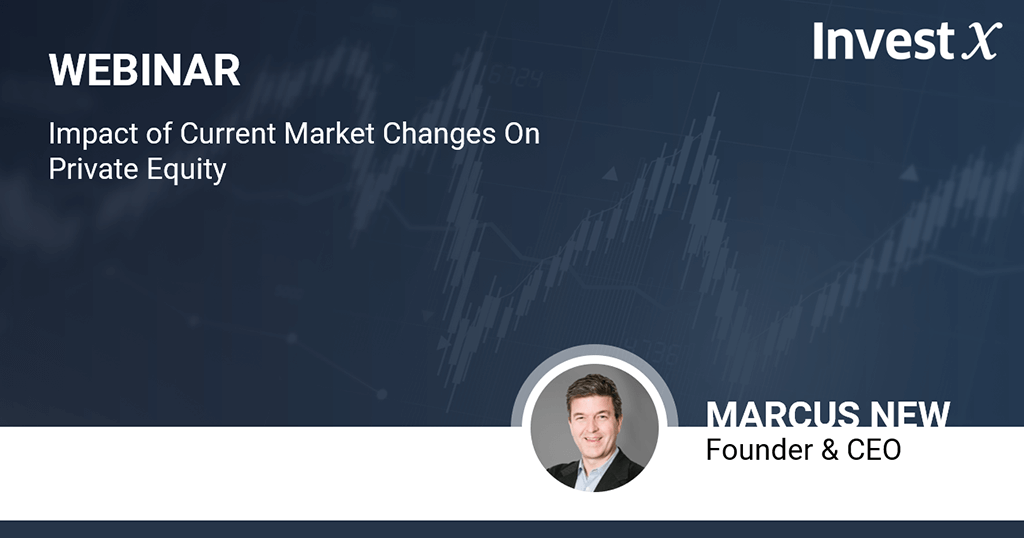
The recent market changes are impacting investors and companies alike. With every dip in the market comes an opportunity that not many investors bank on. There is no question that the speed and severity of the decline in the public markets have caught most of us by surprise. Marcus New, CEO of InvestX, broke down some elements and trends affecting both private and public markets on a macro level and how InvestX will be looking at company valuations as we advance. Through an in-depth analysis, InvestX has identified 4 groups venture backed companies:
Group 1: High cash flow: During the 2021 bull market, 2021 many venture-backed companies completed substantial funding rounds and entered 2022 with a cash-heavy balance sheet which will help them ride out this market volatility. They have the cash to grow into this new valuation reset and potentially avoid any valuation reset. This will help preserve net returns but can lead to an extension of the payback periods, reducing IRR for investors. This would be an ideal situation considering the reset of the public markets.
Group 2: Low cash flow: The second group of companies needs to raise capital and this group has a couple of subcategories.
Sub-group 1: The first subcategory comprises moderate or poorly performing companies that need to raise cash. This group should expect a down round and investor-friendly terms such as anti-dilution, rachets, or bigger dividends. This will cause existing investors to mark down their positions in their portfolios. The closer they come to running out of cash, they become more impaired.
Sub-group 2: The second subcategory includes higher-performing companies that need to raise capital. This group will be much more sheltered, we expect the companies to see a flat or modest increase in their valuations. Considering these companies have grown about 30% to 100% a year since their last round, at least a year and a half or two years ago, it will be actually be a down round if they raise capital at a flat valuation. The way out of a down or flat round scenario is when an earlier investor who has a lower cost basis leads the next round to protect their portfolio mark. This allows companies to receive cash while investors maintain a lower cost basis, called ‘marking up your book.’ If this happens, the company’s current valuation needs to be reconsidered, and a rigorous analysis should be conducted before investing. The good news for existing investors is that the company does not require any markdown on the new round. Having become cash-heavy, these companies can now grow into the new valuation.
Group 3: Premium: Some companies are doing very well, investors are still willing to pay a premium. For example, SpaceX is doing a secondary at a significant premium compared to the last round. Only 10 to 15% of companies exist in this category and are market leaders. What they offer is unique despite having some competitors. These companies should continue to drive premium pricing down the road.
Group 4: Secondary: The last group is the secondary market. In InvestX experience investing in the pre-IPO market, we’ve seen three incredible buying opportunities. The first was in 2016, when secondary prices were trading at about a 25% to 35% discount of primaries on excellent, de-risk companies. The market was not sophisticated and inefficient, so there were very few buyers if you wanted to sell your shares in the secondary market.
The most exciting times were March and April 2020. We launched our distress seller’s basket fund at the height of the COVID fear, and we knew the world-class companies we invested in would go no-bid with so much fear. The idea was to have our fund put in low bids to see if a desperate seller would accept it. There was so much fear in the market that people needed to sell, and we could buy at a very substantial discount. The COVID market had a lot of desperate sellers, and the fund returned 4.2x in less than two years.
We believe that the next six to 12 months will be another one of these compelling times to make money in private equity. We are going to see similar opportunities to the pandemic time. The private markets today have a delay of about four to six months of the public markets. At the beginning of the public market correction in the first quarter private investors had no reason to sell. They could leave their private investments while focusing on managing the other asset classes. However, investors are now forced to investigate the second market to raise funds or sell some of their secondary shares to raise capital.
The current problem is like the pandemic period: there are limited or no bids in the private market. Some traditional investors who bought a lot in the private markets have left the market with the public markets killing the portfolio. Crossover funds have trickled to a stop on new investments. Tiger global soft bank, one of the largest private investors, has suffered significant losses in its hedge funds. There are more opportunities now and fewer bids because, much like the COVID market, a low number of institutional investors are active in the market right now. Many of them are busy dealing with the challenges posed by public securities. This allows us to buy into the sell-off. InvestX plans to be that low bid to attract sellers looking for liquidity.
We are working on a strategy to capitalize on this opportunity and will be back soon with some new offers. We look forward to continuing to create success for you.
Recent Posts
- DataStax to be acquired by IBM: InvestX reaction 24th Mar 2025
- Wiz to be acquired by Alphabet: InvestX Reaction 24th Mar 2025
- Understanding Capital Stack Risk 02th Dec 2024
